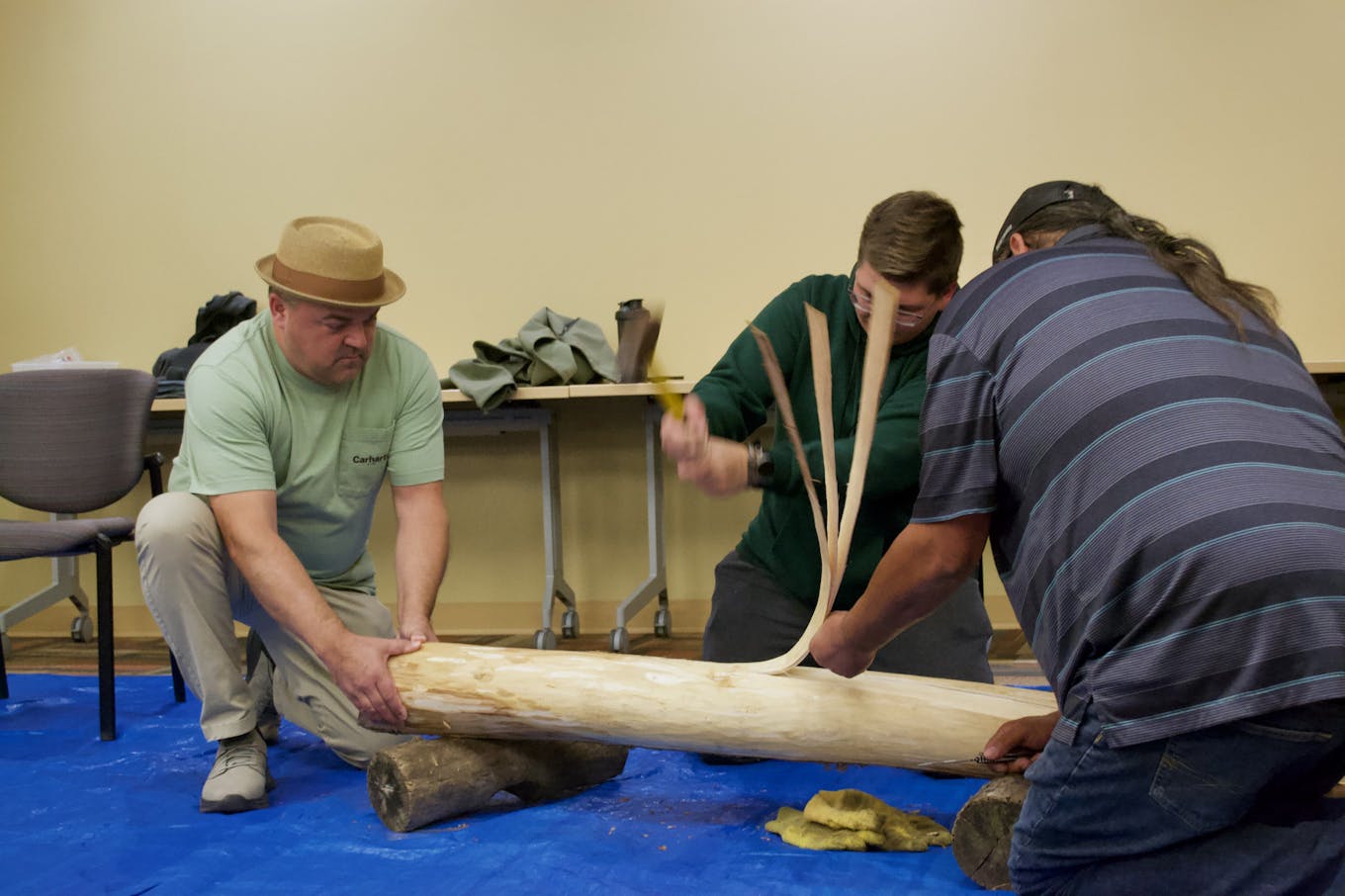Weaving stronger bonds
Mid Michigan College discusses art and culture connection for Indigenous People's Day event

Tables decorated in black ash baskets at the Indigenous Peoples Day event on Monday, Oct. 14, at Mid Michigan College Mount Pleasant Community Room. The event showcased how the black ash wood is splinted and woven. (CM-Life | Soli Gordon)
The sound of a large drum could be heard throughout the room, a beat so strong it reverberated in onlooker's ribs. The rhythmic thudding was accompanied by six voices that rose and fell with the music.
That was how the Indigenous People's Day event at Mid Michigan Community College started on Oct. 14. The college has been hosting the event annually for four years now, with the goal of educating and celebrating the culture of the Anishinaabe people and the Saginaw Chippewa Indian Tribe (SCIT).
The focus of the event was the art of basket weaving, specifically through the use of black ash trees. Keynote speaker Lisa ( Waagosh-Kwe ) Kennedy, an indigenous artist and co-founder of the Niishode (Two Hearts) Collective spoke about her connection to the craft.
After her speech, her husband Adam (Naawikwegiizhig) Avery and two of their friends, Josh and Sarah Homminga, performed a live demonstration on how the baskets are made.
Kennedy said her passion for basket weaving came from two things: learning that her grandmother, Jennie Keezhig, was a basket weaver, and the support of her husband who grew up with the craft.
Now, along with making baskets and selling them, she and Avery travel around Michigan teaching people about the process and tradition of black ash basketmaking.
"It's so awesome to be able to share something so meaningful for both of us," she said. "Yes, we do make these baskets and sell them, but we don't measure that value in dollars. We find the most value in experiences and connections, in teaching others about this part of our culture."
Kennedy said that the black ash trees used for the baskets have many cultural and spiritual connections to her. She said the tree usually has seven or more leaves, which represent the seven grandfather teachings of the tribe, and the trees provide habitats for wildlife, which relates to how indigenous people feel interconnected with all living things.
Kennedy also said the tree is currently at risk. Deforestation and an invasive insect species called the emerald ash borer have caused the tree's population to dwindle, and she said she and her husband have to travel to Wisconsin to harvest more.
"Like the black ash tree, we (Indigenous people) have withstood the test of time and faced immense challenges that intertwine throughout our collective history," she said. "Today, we strive to create spaces where the transference of generational knowledge of our elders can be shared and carried forward to future generations.
"Through our commitment, we strive to truly honor them by embracing and carrying forward the inherent value of Black Ash basketmaking as a living tradition of our people."

Adam Avery (Naawikwegiizhig) and Josh Homminga hold the log down for attendees to participate at the Indigenous Peoples Day event on Monday, Oct. 14, at Mid Michigan College Mount Pleasant Community Room. After the demonstration, the splinting was offered to the room. (CM-Life | Soli Gordon)
When making the baskets, Avery and Josh used a year-old log for their demonstration. The men showed how to put notches at the top of the log, then how to hammer the log with the back of an axe and peel off narrow strips that would be used to weave the baskets.
Avery and Josh recalled helping their parents harvest the wood and peel the strips in their youth. They joked about not enjoying it at the time, but now it means a lot to the both of them.
"I've realized now I had a blessed childhood," Avery said. "And when you start working on these things, you meet people (like the Hommingas) and starting doing things with them ... and you become a family."
After that, Sarah created the base of the basket using a small circle of bark and stretching the strips out from the center, resembling a spoke wheel. Attendants could come up and help weave a strip into the basket, and Sarah said this would become a "memorial piece" to commemorate the event.
One Mid Michigan student that participated at the event and helped peel the log was Jillian Larson. They said their professor changed the class location to the community room so they could participate in the event, but Larson said they were going to attend the event regardless.
"I'm from a tribe in northern Washington," they said. "(Watching) this makes me feel happy, because so much has been lost. It's nice to see that the heritage I didn't get to be a part of still lives."
Scott Mertes is the provost of Mid Michigan College and one of the members of the Indigenous People's Day Event Committee. He said this event was different than in years past, as it was the first hands-on event they had hosted for the holiday.
"It's awe-inspiring, knowing how much work they put into it and that it all ties back to tradition," Mertes said. "That's what makes it impactful to me, is the artists talking and providing their own perspective and experience to the craft."






